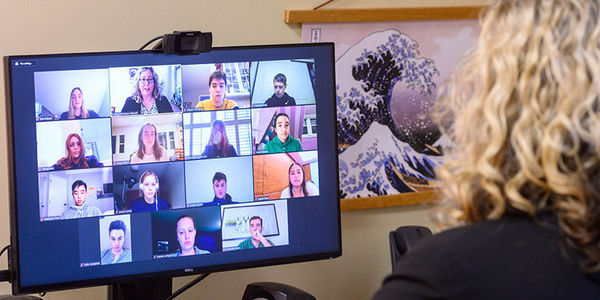

Jessica McManus Warnell (top row, second from right on computer screen) works with students during the
winter session course Recovery and Resilience: Fukushina Case Study.
The University’s first winter session, January 4-27, 2021, included a course offered through the Liu Institute. Jessica McManus Warnell, a professor of Management & Organization at the Mendoza College of Business, created and instructed Recovery and Resilience: Fukushima Case Study.
The course built upon previous faculty research and site experiences in Japan by McManus and other members of a multidisciplinary team of professors engaged in the “Energy, Justice, and Fukushima” project that was funded through the Liu Institute’s Justice and Asia grants.
Sixteen students enrolled in the Fukushima course, representing 15 majors and each undergraduate level. The class diversity allowed students to interact, collaborate with, and learn from students they might not otherwise have encountered.
“My goal was to offer students an opportunity to do a deep dive into a topic that may be new to them, but that they would see has broad relevance to issues we examine in many of our courses and that are critical for today’s students—the well-being of communities, the intersection of business and society, and the critical role of examining multiple perspectives from stakeholders in the grand challenges we face as a global community,” McManus said.
"It was meaningful to focus on emotion, resilience, and society when discussing the impact of a disaster" — Natalia Adriance
The students learned from a range of guest speakers and examined public reports, scholarly analyses, and community stakeholder testimonials to formulate informed perspectives on the elements of and challenges to community recovery and resilience in the wake of arguably the most significant natural and man-made disaster in recent history.
Natalia Adriance, a senior in accounting and history, enrolled in the Fukushima course to learn about a topic outside her course of study. Although she had a basic knowledge of the triple disaster of earthquake, tsunami, and nuclear meltdown, the class helped her better understand such dimensions as resiliency, social impact, and sustainability.
“There was such a wide range of students in the course, which made it interesting to see how everyone approached the topics,” she said. “And it was meaningful to focus on emotion, resilience, and society when discussing the impact of a disaster because the impact isn’t as clear cut as it may seem when only looking at structural damage and devastation.”
 Jessica McManus Warnell
Jessica McManus WarnellMcManus said the course was especially timely because students were able to draw parallels to the coronavirus pandemic.
“Both reflect our inherent interconnectedness, among and within countries,” she explained. “Both reflect the devastating effects of inconsistent, erratic, or irresponsible messages from leaders, and what happens when we fail to use empirical data to make policy decisions. And both are vivid reminders of the massive challenges to well-being and equitable prosperity faced by communities around the world.”
Originally published by Liu Institute at asia.nd.edu on May 18, 2021.